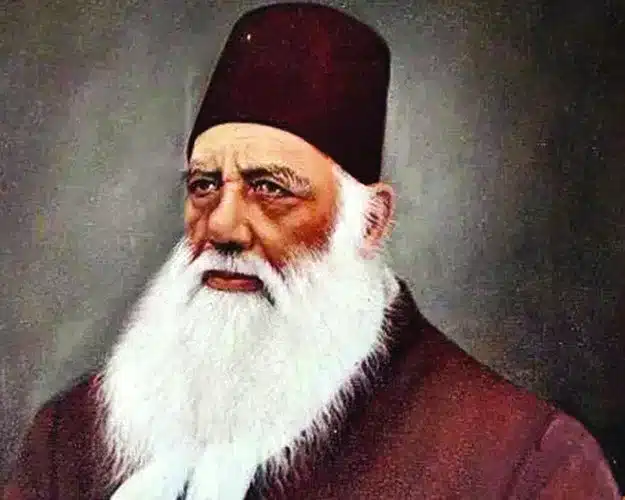Celebrating life and Legacy of Sir Syed Ahmad Khan

Sir Syed Ahmad Khan (17 October 1817 – 27 March 1898) was a Muslim philosopher, social activist, educator and founder of the Anglo-Mohammedan Oriental College, Aligarh, Uttar Pradesh.
Early Life
Sir Syed Ahmad Khan was born on 17 October 1817, in Delhi, India. His father, Mir Muttaqi, was very popular with the Mughals, and many of his family members were in the Mughal court.
In addition to Persian, Arabic, Urdu, and orthodox religious studies, he learned mathematics and astronomy. Swimming and wrestling were some of his favorite sports.
At the beginning, he studied medicine, but he didn’t finish it. Due to financial troubles, he had to abandon his formal studies.
He was offered a job at the Mughal court but declined and joined the British civil service instead. He later went to the East India Company College and got a degree in law and judicial services.
Career
His first job was as a clerk in Agra’s courts of law, and in 1840 he was made an official ‘Munshi‘. In the Judicial Department, he had plenty of time to pursue other interests, including writing.
At the beginning, he wrote religious tracts. His book “Monuments of the Great”, about Delhi’s antiquities, was published in 1847.
During the Indian Mutiny of 1857, he stayed loyal to the British, even saving several Europeans. When the rebellion broke out, he was working as the chief assessment officer at the court in Bijnor.
He wrote a booklet called Asbab-e-Baghawat-e-Hind (The Causes of the Indian Revolt) in 1859, in which he explained what he thought were the causes.
Among his great interests was religion, and he respected all religions. A commentary he started on the Bible said both Islam and Christianity are descended from Abrahamic religions.
He realized the benefits of Western-style education and developed a passion for it in the 1850s. In 1858 and 1863, he set up modern schools at Muradabad and Ghazipur because he thought scientific education was crucial.
In 1864, he moved to Aligarh, where he established the first scientific association of its kind in India, the Scientific Society of Aligarh. The society published scientific journals in English and Urdu, ran conferences, and gave away funds for education.
Many of his writings encourage liberal interpretations of the Islamic scriptures, because he felt orthodoxy was hindering the development of Muslims. His liberal views were opposed by the Muslim clergy, so he stopped talking about religion and focused on education.
Following the establishment of schools for kids, he founded the Muhammadan Anglo Oriental College in 1875 to help Indian Muslims get an education and develop economically, scientifically, and socially. It’s now known as Aligarh Muslim University (AMU) and is one of India’s top universities.
He died on 27 March 1898, in Aligarh, India. He was buried in Sir Syed Masjid at the campus of Aligarh Muslim University.
Literary works
He wrote a bunch of books, like Khutbat-e-ahmadiya, Alkhutbat Al Ahmadiya, Asbab E Baghawat E Hind, History Of Bijnour Rebellion, Ital E Ghulami, Ik Nadan Khuda Parast, Tafseer-ul-Quran, etc.
Award
In 1869, the British government awarded him the Order of the Star of India.
Observer Voice is the one stop site for National, International news, Sports, Editor’s Choice, Art/culture contents, Quotes and much more. We also cover historical contents. Historical contents includes World History, Indian History, and what happened today. The website also covers Entertainment across the India and World.

